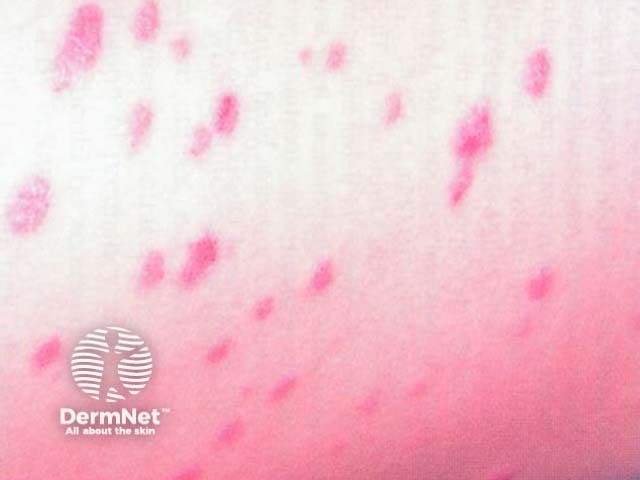Main menu
Common skin conditions

NEWS
Join DermNet PRO
Read more
Quick links
For each of the ten cases, study the image(s) and then answer the questions. You can click on the image to view a larger version if required.
Each case should take approximately five minutes to complete. There is a list of suggested further reading material at the end of the quiz.
When you finish the quiz, you can download a certificate.

What is the diagnosis?
Acute guttate psoriasis. An antecedent streptococcal infection is frequently the precipitating cause. This form of psoriasis characteristically presents acutely, with numerous mildly pruritic or asymptomatic small "teardrop" papules and plaques. Scale is not as prominent as in chronic plaque psoriasis. There may be a history of preceding chronic plaque psoriasis. A drug eruption should be considered in the differential diagnosis, but penicillin rashes are characteristically morbilliform.
Explain the linear lesion.
Active psoriasis favours areas of trauma. In this case, the patient had scratched her itchy skin a few weeks earlier, resulting in Koebnerisation, ie. a linear plaque of psoriasis. The pathogenesis of psoriasis is thought to involve erroneous wound healing.
What management should be recommended?
Symptomatic topical therapy with mild topical steroids and emollients can be recommended. Cautious sun exposure or phototherapy is helpful. The management of an extensive or prolonged episode of guttate psoriasis should be discussed with a specialist dermatologist. Photochemotherapy or a systemic agent is occasionally necessary.
What is the prognosis?
In most cases, the acute episode settles within a few months. The skin condition may evolve into chronic plaque psoriasis. Relapse of guttate psoriasis may occur with further episodes of streptococcal infection.